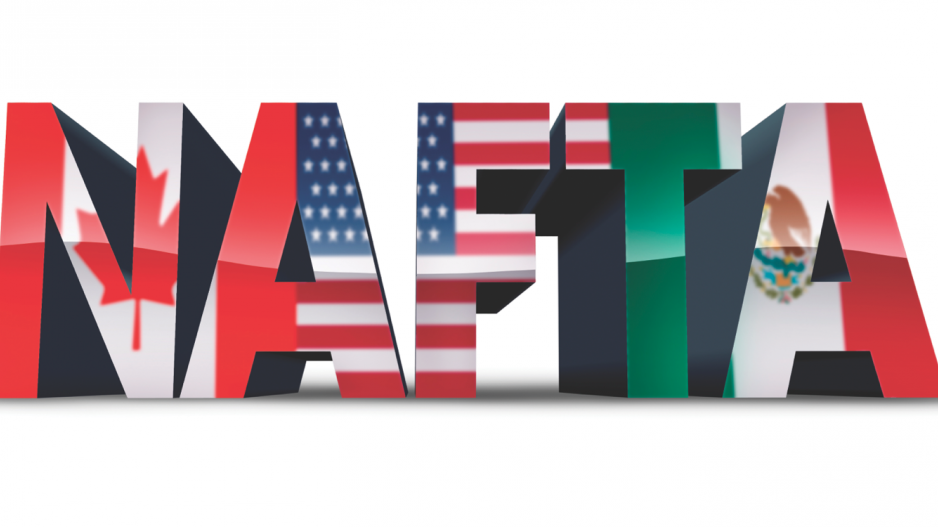Effective dispute resolution mechanisms are critically important to Canada in North American Free Trade Agreement (NAFTA) renegotiations. They are also extremely contentious.
Many have described dispute resolution mechanisms as an essential component of NAFTA for Canada, while the U.S.’s desire to remove them has been dubbed a “poison pill.”
However, there is debate over whether they should be the issue upon which Ottawa stakes everything in its negotiations.
See also: Zombie NAFTA looms
“Canada doesn’t use the NAFTA dispute resolution that much,” Keith Head, professor of business economics at the University of British Columbia’s Sauder School of Business, said on Business in Vancouver’s Roundhouse Radio program. “It often takes its disputes with the U.S. to the World Trade Organization [WTO] dispute mechanisms, and those are going to continue to exist as long as the U.S. stays in the WTO. So it’s not really clear that this is the hill that we really want to die on. If the Americans don’t like it and we don’t really use it that much in practice, maybe we should be focusing on other things.”
There are three dispute mechanisms under NAFTA. The two most commonly discussed are contained in chapters 11 and 19.
Chapter 11 establishes a dispute resolution mechanism aimed at protecting investors from NAFTA countries and ensures equal treatment for them. The investor-state dispute settlement grants investors the right to sue foreign governments without first pursuing legal action in the country’s court systems.
Chapter 19 deals with countervailing duties and anti-dumping. Countervailing duties are tariffs put on goods by an importing country to offset a subsidy provided by the government of an exporting country.
A country can file a dispute under Chapter 19 to determine whether the countervailing duty is an appropriate response to the subsidy provided by the exporting country’s government.
Both chapters allow for trade disputes to be settled through national panels rather than domestic courts. Anti-dumping disputes occur when a country puts a tariff on import goods that it deems to be priced below fair market value.
Canada has filed the most NAFTA Chapter 19 claims: 45 of the 120 total filed.
It is also the country with the least number of claims against it: 19.
The U.S., on the other hand, was the target of more than two-thirds of all Chapter 19 claims: 81. It has also filed the least number of Chapter 19 claims against other NAFTA countries: 34.
Canada has not had the same positive record when it comes to Chapter 11.
“I would have thought that we as a country would want to keep Chapter 19 as a fail-safe for trade issues,” said Peter Glossop, a foreign investment lawyer with Osler, Hoskin & Harcourt LLP. “And I thought we would have been less interested in keeping Chapter 11, just given our historical experience.”
While Canada has the least number of Chapter 19 claims to deal with, it is the country with the most Chapter 11 claims against it: 41 out of 85, according to a report from the Canadian Centre for Policy Alternatives think tank.
According to the report, among the settled and decided cases, Canada has won only half of the claims against it (nine out of 17), costing the Canadian government $314 million.
On the other hand, the U.S. has lost none of the decided and settled Chapter 11 claims made against it.
Even with Canada’s less-than-stellar track record, countries on both sides of the 49th parallel benefit from Chapter 11, said Werner Antweiler, associate professor with the University of British Columbia Sauder School of Business’ strategy and business economics division.
He said the cases Canada has lost under Chapter 11 were mostly inconsequential in the long run, despite high levels of media coverage.
“Many fears of Chapter 11 are larger than the reality of Chapter 11,” he said. “We haven’t lost any battles for policy domain, where Chapter 11 would have infringed on Canada to pass legislation that would protect health and safety, workers’ rights and the environment.”
But while Chapter 11 dispute resolution has been beneficial to both countries, Antweiler said NAFTA can live without it, and the priority should be preserving Chapter 19 .
Even with the U.S.’s perfect Chapter 11 record, Trump and his negotiating team want to scrap it.
“If this is what it takes to keep the rest of NAFTA alive, then let’s do it,” said Antweiler. “It’s a relatively small price to pay to preserve the greater good, which is free trade between the countries.”




